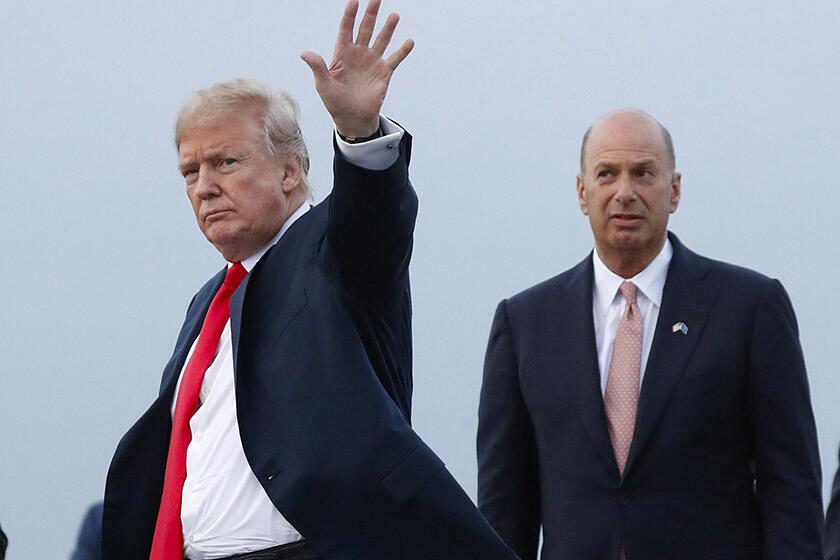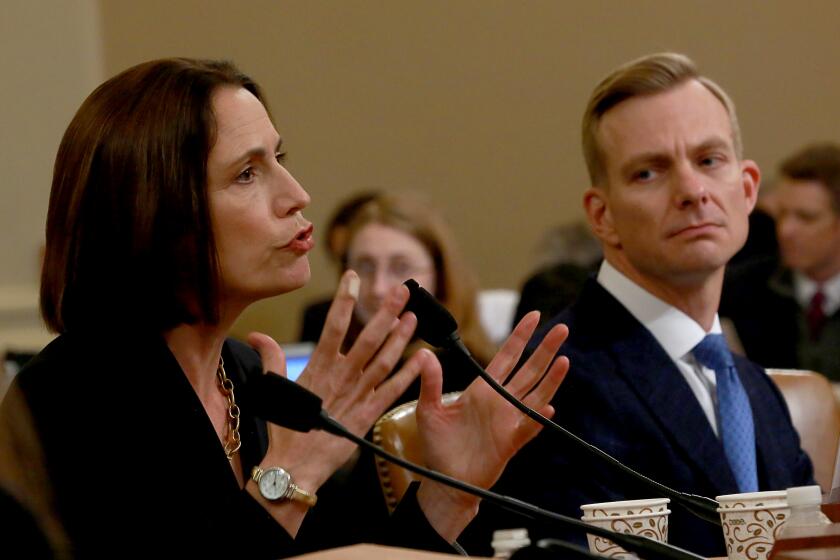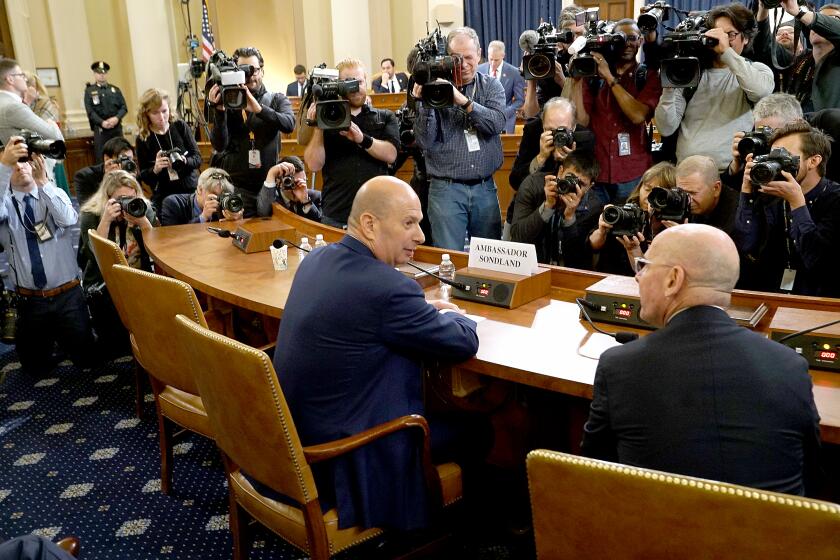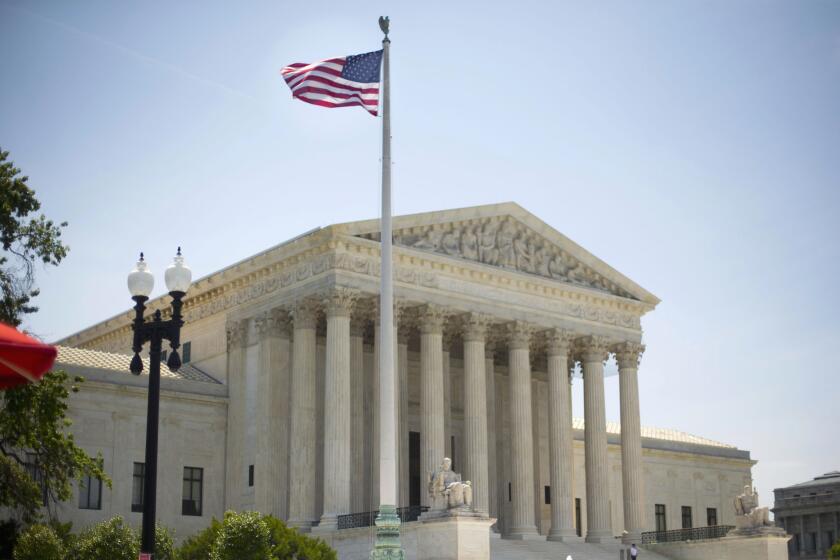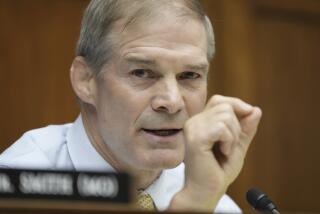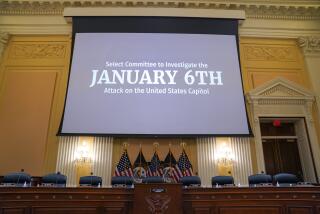News Analysis: After Trump impeachment hearings, both sides scramble
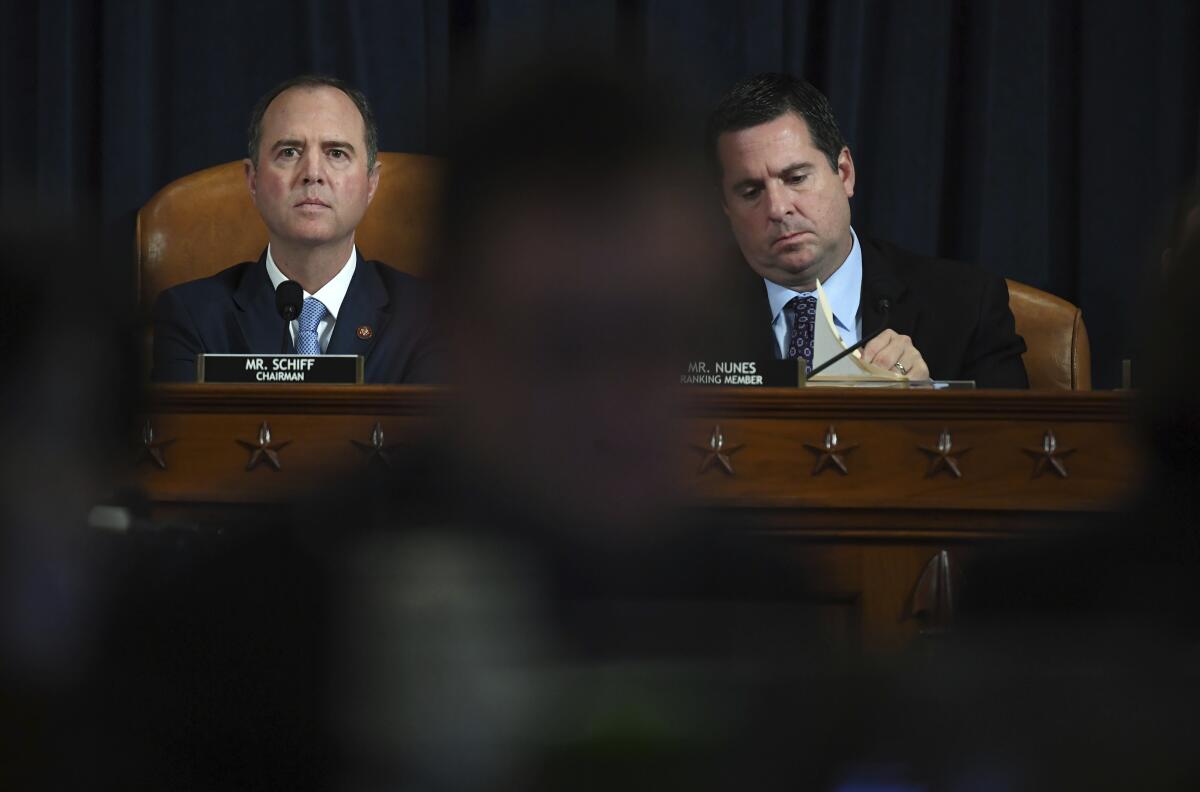
After five grueling days of public testimony by a dozen witnesses, evidence appeared overwhelming in the House impeachment inquiry that President Trump directed a campaign to get Ukraine’s leader to investigate Democrats in exchange for an Oval Office meeting.
But as Congress left for a long Thanksgiving break Thursday, there was no sign that the damaging testimony had swayed Republican lawmakers to support impeaching the president or ultimately convicting him.
Only one Republican on the House Intelligence Committee, Rep. Will Hurd of Texas, who is not running for reelection, appeared troubled by the president’s actions.
“I disagree with this sort of bungling foreign policy,” he said during the hearing Thursday. But he added, “I have not heard evidence proving the president committed bribery or extortion,” two of the charges that Democrats have suggested might be used in articles of impeachment.
Almost everyone in Trump’s orbit confronts the same dilemma, sooner or later: Stick with Trump and risk lasting damage, or break away and hope to survive his wrath. Gordon Sondland broke away in spectacular fashion.
Trump sought to shore up his support in the Senate, hosting a small group of Republicans for lunch at the White House, as he has done regularly since Democrats launched the impeachment probe in September.
The White House counsel, Pat Cipollone, and senior advisors Kellyanne Conway and Jared Kushner met with another group of Republican senators to game out a likely Senate trial if the House impeaches the president, said a person familiar with the meeting.
The discussion, the person said, focused on the prospective trial’s duration, not the “foregone conclusion” of an acquittal for the president. A Senate trial would probably last at least two weeks, and would begin in January if the House votes to impeach this year.
That could be a problem for the six Democratic senators running for president, who probably would be pulled off the campaign trail in the crucial weeks before the Feb. 3 Iowa caucuses.
Republicans appeared resigned to the prospect that Trump will become the third president in U.S. history to be impeached — even if no Republicans support it.
In the final day of a week of House impeachment hearings, a former senior White House aide warned that President Trump and his Republican allies have embraced a “fictional narrative” on Ukraine that is propagated by Russian security services to undermine U.S. democracy.
“This is the old line, it’s a Greek tragedy, our fate has been cast, we just have to play out our roles,” Rep. Michael K. Conaway (R-Texas) said in an interview.
“It’s pretty clear that Democrats are going to impeach the president in the House,” he added. “They’ve really made their minds up and the real issue is when they move to the Senate.”
Democrats believe they proved everything they needed, sometimes in dramatic fashion, by bringing in what amounted to a parade of prosecution witnesses.
Hour after hour, day after day, White House aides, career diplomats, national security officials and an ambassador who donated $1 million to Trump’s inaugural festivities detailed the president’s efforts to press Ukraine to investigate a debunked conspiracy theory involving the 2016 election and former Vice President Joe Biden’s efforts to fight corruption in the country.
Although Trump had invited Ukrainian President Volodymyr Zelensky to the White House in May, his aides made clear that the coveted meeting would not occur until Zelensky announced the investigations that Trump wanted. Zelensky never did and the Oval Office meeting still has not taken place.
Trump also withheld nearly $400 million in security assistance to Ukraine. The weapons and other aid were released on Sept. 11 after a whistleblower’s complaint first raised concerns about the scheme, and lawmakers demanded answers.
Trump has expressed frustration that his House allies were unable to halt a cascade of damaging disclosures. But as in his previous crises and scandals, he projected both a sense of victimhood and faith that he would ultimately prevail.
“Keep fighting tough, Republicans, you are dealing with human scum who have taken Due Process and all of the Republican Party’s rights away from us during the most unfair hearings in American History,” he tweeted. “But we are winning big, and they will soon be on our turf.”
The president’s confidence may be warranted by the calcified partisanship that has made public opinion about the president almost unmovable.
“We are living in two separate countries, with two separate newspapers, two separate cable channels, two sets of people with completely opposite conclusions,” said Frank Luntz, a Los Angeles-based GOP pollster who has conducted several focus groups during the impeachment inquiry.
Impeachment hearings. A Democratic primary debate. Endless cable news chatter. The meeting of American politics and peak TV.
“If you are an honest pollster, this is something you have never experienced in your lifetime. Where you stand depends on who you speak to. It’s not just social media, it is society — we don’t talk to people we disagree with,” he said. “And the consequences of this are awful.”
With help from conservative media allies, Republicans have tried to paint the Democratic-led probe as muddy, confusing and a product of Washington insiders who resent Trump and never accepted the legitimacy of his election.
During the hearings, GOP lawmakers brusquely dismissed witnesses’ recollections as “secondhand” and questioned their patriotism or integrity.
But they did not challenge the narrative that emerged of a conflicting two-track policy toward Ukraine — one led by a small group around the president seeking to boost Trump’s 2020 reelection bid, and another led by national security and foreign policy professionals trying to support Ukraine’s fledgling democracy and war against Russia.
Supreme Court weighs Trump’s bid to shield his taxes from Congress.
Democrats argued that the first track amounted to an unacceptable presidential abuse of power.
“What we’re talking about is far more serious than a third-rate burglary,” said Rep. Adam B. Schiff (D-Burbank), chairman of the Intelligence Committee, evoking Watergate during an emotional closing statement Thursday. “The difference between then and now is not the difference between Nixon and Trump. It’s the difference between that Congress and this one.”
In the weeks ahead, Republicans plan to reinforce their argument that the House inquiry is a partisan witch hunt, and that even if Trump’s demands to Ukraine were not as “perfect” as he insists, his misjudgments do not warrant impeachment and ouster from office.
“I don’t think anybody seriously thinks he’ll be convicted,” said Matt Schlapp, a Trump ally who leads the American Conservative Union. “It’s all about just weakening him.”
Democrats “believe that if this goes well, it will enhance their ability to beat him” next year, he added.
Ronna McDaniel, chairwoman of the Republican National Committee, seemed untroubled by the testimony. She said impeachment has been a fundraising boon for the party, which raised $25 million in October.
“There is an absolute influx of small-dollar donations,” she said. “The impeachment has actually ramped that up.”
It’s too soon to measure the effect, if any, of this week’s marathon testimony in opinion polls. But early surveys and focus groups have generally shown that voters’ views on impeachment track closely with their views of Trump’s overall performance.
Rep. Raja Krishnamoorthi (D-Ill.), a member of the Intelligence Committee, said he sees a chance that the most damaging testimony could “break through” to voters in “swing districts and places where you have a lot more independent-minded voters.”
But the holiday recess also may blunt any momentum Democrats were able to create with three days of wall-to-wall testimony. And there’s little sign that the impeachment drama is going to bring a divided nation together or change Trump’s approach to foreign policy.
Fiona Hill, the British-born former White House national security aide, sounded almost plaintive Thursday as she pleaded with lawmakers to not promote “politically driven falsehoods that so clearly advance Russian interests,” warning that the Kremlin is gearing up to meddle in the 2020 election, just as it did in 2016.
“We must not let domestic politics stop us from defending ourselves against the foreign powers who truly wish us harm,” she said.
More to Read
Get the L.A. Times Politics newsletter
Deeply reported insights into legislation, politics and policy from Sacramento, Washington and beyond. In your inbox three times per week.
You may occasionally receive promotional content from the Los Angeles Times.
